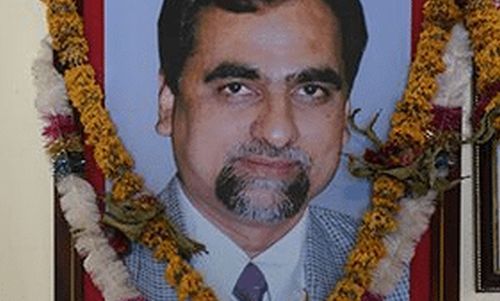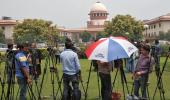 The Maharashtra government on Friday told the Supreme Court that the batch of petitions seeking an independent probe into the alleged mysterious death of special Central Bureau of Investigation judge B H Loya were motivated and aimed at targeting 'one individual' in the guise of upholding the rule of law.
The Maharashtra government on Friday told the Supreme Court that the batch of petitions seeking an independent probe into the alleged mysterious death of special Central Bureau of Investigation judge B H Loya were motivated and aimed at targeting 'one individual' in the guise of upholding the rule of law.
It said the idea behind these petitions was to keep the 'pot boiling' against this individual and urged the apex court not to order an investigation which will create doubts about judges and the judiciary.
A bench of Chief Justice Dipak Misra and Justices A M Khanwilkar and D Y Chandrachud said it will pass orders and directed the parties to file written submissions, if any, with regard to the case.
"This court has the power to order investigation and it has exercised its power in cases of fake encounter or riots. But in this case, the court should be very careful in ordering the investigation as the serving judges and even the administrative committee of Bombay high court will then have to record their statements under Section 161 of CrPC (Code of Criminal Procedure) in the case," senior advocate Mukul Rohatgi, appearing for Maharashtra, said.
He said the court should also keep in mind that for three years after the death of Judge Loya on December 1, 2014, nothing has happened and no petition were filed. But now if the court orders investigation in the case on these petitions, there will be some repercussions.
"The idea behind these petitions is to keep the pot boiling. The newspapers will have a field day. Entire sequence in this case is now before the court. The statement of judges who were along with Loya in his last moments are before the court. If the last scene theory is applied, then the last scene persons are the two judges of Bombay high court and district judges," he said.
"They (petitioners) say they are here to protect the rule of law but somehow target an individual who they think is so powerful that he has done all the things. They are using death of a judge as facade so that the judiciary orders an inquiry against that individual. But in that motive, they are causing immense damage to judiciary," Rohtagi said.
He also said the matter was of importance for the judiciary and if the apex court decided to order a probe, the state government was ready to comply with the directive.
During the arguments, the senior lawyer told the bench that this was the apex court and the Chief Justice of India is in the role of 'paterfamilias' (the head of a family or household) of the judiciary.
"It is his (CJI) obligation to see judiciary remains independent and the rule of law flourishes. If these PILs are allowed, then it would affect the judiciary and doubt will be created about high court and district judges," he said.
Rohtagi referred to media reports saying that Judge Loya, after he complained of chest pain, was taken to hospital in an auto-rickshaw and some petitioners even doubted that they stayed at the guest house in Nagpur.
"These articles need not be believed as there was a judge who said his car was used to take Judge Loya to hospital and even the wife of Judge Loya had said that she had talked with him when he was at the Ravi Bhavan guest house," he said, terming the articles as 'innuendos' and the PILs as a 'facade'.
He said this was a serious case of death of a district judge and the petitions based on media reports should not be entertained as it could dent the image of the judiciary.
Rohatgi told the bench that petitioners arguments are not for upholding the rule of law but it is for the destruction of judiciary.
At the outset, Rohatgi, who completed his arguments, detailed the sequence of events to the bench from November 29, 2014, when Judge Loya boarded the train for Nagpur along with other judges to attend the marriage of their colleague's daughter.
The next morning of November 30, they reached Ravi Bhavan at Nagpur and attended the wedding along with the judges of the high court.
In the wee hours of December 1, he complained of chest pain. He also gave details as how the judge was taken to Dande hospital where his ECG was taken and then to Meditrina Hospital, Nagpur, where he was declared brought dead.
Rohatgi gave details of the investigations done so far, statements given by judges who were along with Loya during his last moments and claimed that there was no wrongdoing.
Loya, who was hearing the high-profile Sohrabuddin Sheikh fake encounter case, had allegedly died of cardiac arrest in Nagpur on December 1, 2014 when he had gone to attend the wedding of a colleague's daughter.
The apex court was hearing a batch of pleas including those filed by Bombay Lawyers' Association, Congress leader Tehseen Poonawala and Maharashtra-based B S Lone seeking an independent probe into Loya's death.










 © 2025
© 2025